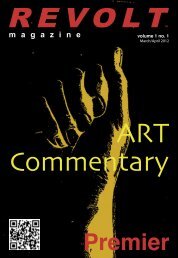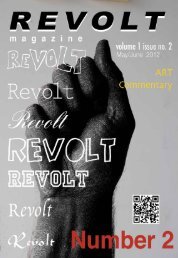Download PDF Version Revolt Magazine, Volume 1 Issue No.4
Download PDF Version Revolt Magazine, Volume 1 Issue No.4
Download PDF Version Revolt Magazine, Volume 1 Issue No.4
Create successful ePaper yourself
Turn your PDF publications into a flip-book with our unique Google optimized e-Paper software.
THE<br />
R LIST<br />
Social Activism in fancy Tones<br />
On how celebrities engage to improve contemporary society<br />
BY LAURENCE HOFFMANN<br />
Promoting oneself is commonly accepted, if not<br />
practiced, by people in all strata of society. Individuals<br />
are more and more managing themselves as<br />
brands, a trend put in motion by social media like<br />
Facebook and Twitter, that heightens the need to<br />
make an original mark in a world over-crowded with<br />
competing information. On the business side this<br />
applies to advertisements, which effectively use<br />
celebrities to create instant familiarity through the<br />
immediate recognition of a particular celebrity’s<br />
brand.<br />
Recently self-branding has taken a new turn as<br />
more popular figures have applied their massmarket<br />
appeal to serious social issues. A cursory<br />
list of examples includes Mark Ruffalo and Yoko<br />
Ono with son Sean Lennon opposing fracking<br />
with Artists Against Fracking; Joaquin Phoenix<br />
defending the rights of people and animals together<br />
with -respectively- Amnesty International and<br />
Peta; Leonardo Di Caprio trying to prevent total<br />
degradation of the environment with Live Earth<br />
and Wildlife Conservation Society; Ziggy Marley,<br />
Lady Gaga, Linkin’ Park, BBKing and others making<br />
efforts to bring music education into disadvantaged<br />
public schools with Little Kids Rock; George Clooney<br />
is one of the United Nations Messengers Of Peace<br />
and together with Brad Pitt, Matt Damon, Don<br />
Cheadle and others has founded Not On Our Watch<br />
to condemn the violations of human rights in Darfur,<br />
Burma, and Zimbabwe; Angelina Jolie is Special<br />
Envoy for the United Nations. These are just a few<br />
of the causes in which some of the most prominent<br />
American stars emerge as “social activists” and in<br />
some cases as “social entrepreneurs”.<br />
For his activities (other than being Walden Smith in<br />
Two and a Half Men and occasionally appearing on<br />
the cover of magazines with old and new flames)<br />
Ashton Kutcher can be considered a “social<br />
entrepreneur”. The business activities of his<br />
company A-Grade are geared towards improvements<br />
in contemporary society.At TechCrunch, an event<br />
that focuses on start-up companies keen to enter<br />
the field of technology development and new media<br />
held in April/May in NYC, Ashton Kutcher explained<br />
the criteria behind the investments of A-Grade and<br />
revealed his critical take on corporations.<br />
Ashton Kutcher, Guy Oseary, and Michael Arrington, TechCrunch Disrupt NYC 2013, video stills. Courtesy of Laurence Hoffmann.<br />
With his notorious sardonic language typical to an<br />
“agent provocateur”, he decries the concept of<br />
Big Brother. He warns that societies should prefer<br />
the decentralization of the security system instead<br />
of accepting that one major entity controls the<br />
masses. Ashton proposes that security should be<br />
based on the interaction among individuals. This<br />
critical approach defines an optimistic point of view<br />
on local communities built by the genuine personal<br />
relationships between people. Such conviction<br />
For his eclectic interests and activities, Ashton<br />
belongs -together with all socio-politically engaged<br />
celebrities- to that figure so much in vogue in the<br />
Renaissance, “the Renaissance Man”. In the 15th<br />
and 16th Centuries the reevaluation of the models<br />
from Antiquity took an important step. Artists<br />
and philosophers were called to court (royalty,<br />
aristocracy or new bourgeoisie) to engage into the<br />
political discourse and became spokes persons,<br />
aka ambassadors. What made them “Renaissance<br />
implies a strong criticism towards the general Men” was their versatility in various fields of culture,<br />
opinion that our western (and newly BRIC) societies science, politics and the conviction that societies<br />
are tending towards a more anonymous global could harmonically entail all these aspects. These<br />
system.<br />
societies were literally called Utopia, a term that<br />
today has taken on the connotation of “illusionary<br />
On the practical business level, Ashton focuses and unrealistic”.<br />
on financially supporting and strengthening<br />
technological platforms that enhance social sharing. This lead to an open conclusion: Is social activism<br />
And since interconnectivity is fundamentally an in all its forms a sheer idealistic endeavor or can<br />
element of mutual trust, it is especially through<br />
social media that a stronger connection between<br />
the contribution of mass mediated personae really<br />
reach the masses and help make the change?<br />
individuals can be achieved and local communities<br />
are therefore spontaneously formed.<br />
REVOLT<br />
<strong>Magazine</strong> Number 4, 2013<br />
4





